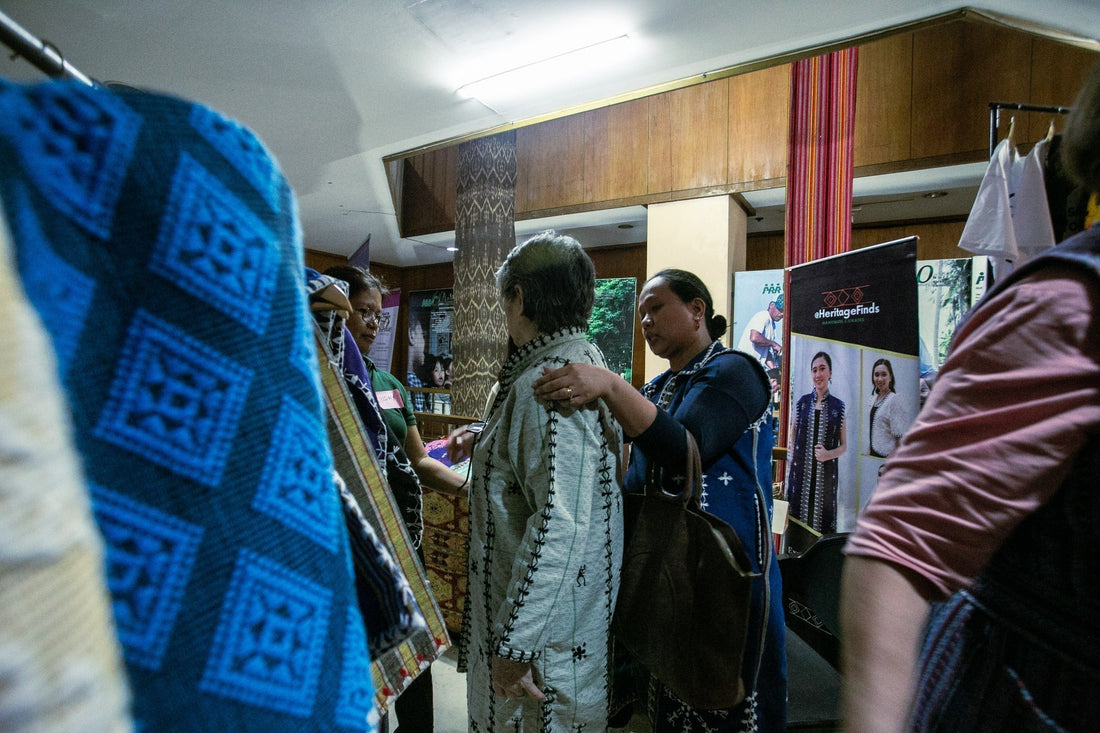
Celebrating women's role in Philippine weaving and heritage preservation - International Women's Day
Share
The International Women's Day, on March 8, a global annual event we celebrate with the rest of the world, is fast approaching. The theme for 2025 is #AccelerateAction for Gender Equality - #AccelerateAction means taking decisive actions towards increasing the rate of progress to achieve gender equality, which is projected to take at leave five more generations to happen.
At HeritageFinds we celebrate the role that women play in heritage preservation, social enterprises including in preserving weaving traditions and time-honored craft of embroidery, beadwork, and dance and painting, while supporting the resilience of the communities they belong to or work with.
Progress and Actions for Gender Equality for All
The Philippines has consistently achieved moderate progress in women's rights and gender equality, ranking 25th among 146 countries included in the 2024 Gender Gap Report.
The country has passed legislations and guidelines that aim to increase opportunities and reduce barriers for women, girls, and gender-diverse persons to participate in public life and in the workforce. Our goal for gender equality doesn't end with achieving gender balance, which is an important step, but having truly meaningful representation in areas or sectors where women and girls and gender diverse persons have been largely underrepresented.
Many systemic challenges remain for Filipino women, some of them are briefly outlined below:
*Funding for women entrepreneurs lags well behind funding for male-led business, and there are several factors at play including lack of confidence and access to closed-off networks. They also experience discrimination when it comes to accessing fund from formal institutions. Childcare and family responsibilities can also keep women entrepreneurs from fully scaling up their business. A supportive family and investment ecosystem can ensure that women-led startups have the best chance as possible to survive and succeed.
*Prevalence of violence against women (VAW) and domestic violence: 17.5% of Filipino women ages 15-49 experience physical, sexual, or emotional violence from their intimate partners. They traumatic events undermine the health, life chances, and dignity of victim-survivors and their families, with long-lasting negative intergenerational consequences.
*While available, women and adolescent girls and boys face barriers to comprehensive sexual and reproductive health and services, such as negative cultural norms and attitudes and ease of access and availability of public funding.
*Women are underrepresented in science and technology (STEM)sectors and are lagging behind in the transition to technology and AI.
*During COVID-19, lockdowns have restricted men and women's economic opportunities and mobility. Women dominated workers in the informal economy and climate-vulnerable sectors, which are often low-paying jobs and highly insecure. This means they have less safety nets compared to their male peers. They also carried the additional burden of caring for the elderly and sick family members and teaching school-age children during long school closures. This, while also finding ways to contribute to household income and food provisions when their partners lost their jobs. An Oxfam article in 2020 "estimated that 47 million women and girls have been pushed into extreme poverty since the pandemic started."
Leave No One Behind
In celebration of the International Women's Day 2025, we reiterate the global call for Leaving No One Behind, as SDG Goal 10 emphasizes, by “reducing inequalities in income as well as those based on age, sex, disability, race, ethnicity, origin, religion or economic or other status within a country.”

At HeritageFinds, we recognize the enormous contribution of women leaders, artisans and entrepreneurs in invigorating local economies and supporting the well-of being of their families and communities. Let us work together in creating a support system for women and girls and gender diverse persons, working with men and all of society, to towards building a gender-responsive and climate just development.
Photo credits: Chantal Eco/ISEA-PRESENT Coalition
Reading references:
*https://pcw.gov.ph/violence-against-women/
*https://www.weforum.org/publications/global-gender-gap-report-2024/digest/
*https://data.unwomen.org/country/philippines
*https://www.oxfam.org/en/5-ways-women-and-girls-have-been-hardest-hit-covid-19
